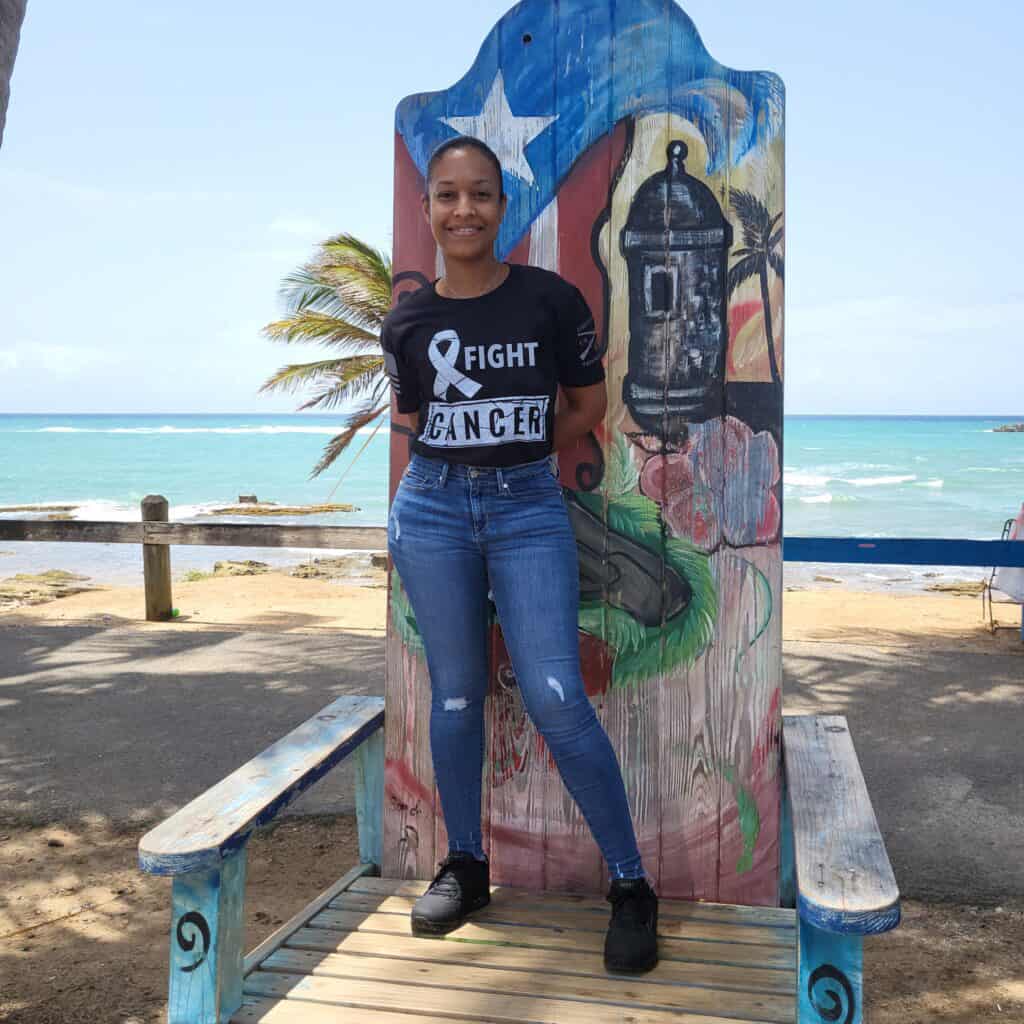
Mayra Santana was 34 when she learned she had stage 2 invasive ductal carcinoma in her left breast and had a mastectomy. Ten months later, tests showed she had the same type of cancer in her right breast. She underwent another mastectomy and is now on hormone therapy.
When Mayra Santana first felt something in her left breast, she wasn’t overly concerned. There wasn’t a history of cancer in her family. But even so, she asked her doctor about it. He thought the small spot was most likely benign and didn’t investigate it further. “I just kept living my life, doing my stuff. It was during Covid and we were all trying to survive that chaos,” Mayra said. “I also did not have health insurance at that time, which made it sometimes difficult to receive regular health care.”
But as the months passed, Mayra noticed the lump was getting larger. During a visit to family in the Dominican Republic over the holidays, her grandmother and mother urged her to have the spot looked at again. “I started to get appointments as soon as I returned home. It was January 2021 and everything was delayed because of Covid,” Mayra said. She finally got an appointment for February. “As soon as the doctor saw me he said, oh, yes, we need to send you for tests, this is not normal.”
Mayra had a sonogram (ultrasound) and a mammogram, both of which were inconclusive. The next step was a biopsy. “Because I had no health insurance, the process was long. I had a difficult time finding a place to get the biopsy done,” she said. Mayra applied for Medicaid and once she was approved, she was scheduled to have the biopsy. The biopsy was started but could not be completed because the mass was too hard. Mayra’s doctor suspected it was breast cancer and recommended she undergo surgery so they could remove the mass and send it to pathology.
The location of the mass was close to Mayra’s left nipple, causing it to be displaced. She developed bruising at the biopsy site, which developed into an open wound, delaying her surgery. “It was so uncomfortable. The skin was very tight,” she said. “When it was time for surgery, the doctor said they would try to save my nipple, which was close to the lump, but they wouldn’t know until they were in there.”
She went into surgery not knowing whether her breast would need to be removed or not, but she tried to remain positive. “I always want to expect the best,” she said. “But when I woke up, my left breast was gone. I cried. And then the pathology report came back and confirmed it was breast cancer.”
After her mastectomy, Mayra’s doctor did not recommend further treatment. Within a few months, her family relocated to Kentucky and Mayra found a new doctor. “They did all the usual tests and a bone scan,” she said. “And then she asked why I didn’t have chemotherapy after the mastectomy. I told her the doctor said it wasn’t necessary.”
Mayra’s new doctor ordered an ultrasound and a mammogram, which revealed a barely noticeable spot on her right breast. A biopsy showed it was the same type of cancer, but stage 1 this time. Ten months after her mastectomy on her left side, Mayra underwent a mastectomy on her right side, followed by reconstruction.
“There are no exceptions when it comes to breast cancer. It can happen to anyone,” she said. “I have to be healthy for my kids, and that helps me on tough days. I am more than this. I know more peace. I’m alive, I’m here, I’m still living.” Mayra is on hormone therapy for at least the next five years. She has a monthly shot and takes daily medication.
“When something like this happens, of course you start questioning, asking why, but a lot of people survive breast cancer,” she said. “I worried about my kids. My daughter was 13, my son was 9. They saw me going to the doctor a lot and would ask questions.”
Mayra found strength in her faith and her family – and in making connections with others undergoing breast cancer treatment. “You need to embrace what is happening to you, and I found that finding others in the same situation is important so you don’t feel alone,” she said. “It’s important to know other people’s journey, it helps inspire you to keep going, to not give up.”
Breast cancer screening and early detection play an important role in your health. Screening tests can help detect breast cancer at an early stage when the chances of survival are highest.



